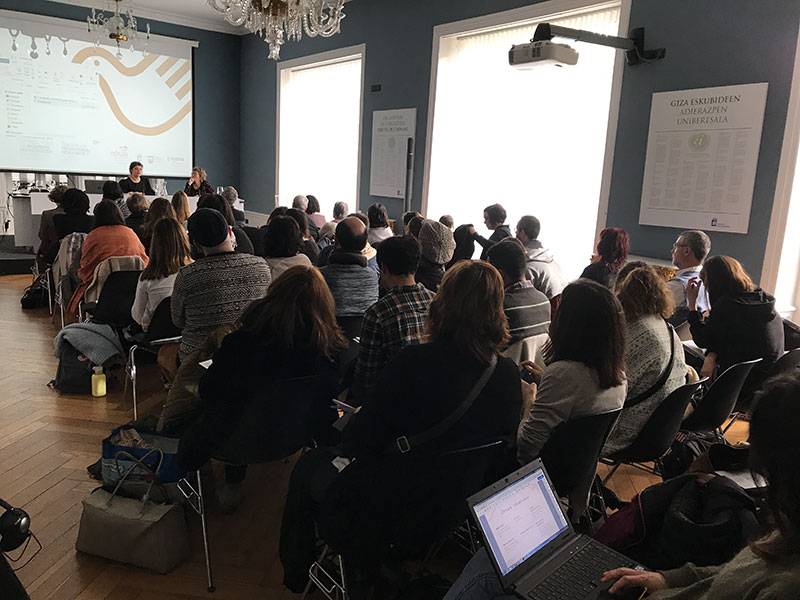What does hate mean? How can we organize education in diverse contexts? How can young people live their freedom of speech in a secure way?

These and many other questions have been discussed on the 19th and 20th of February during the II International Seminar on Pedagogical Resources in Human Rights in the Palace of Aiete, San Sebastián.
80 participants and 12 speakers took part in these two interesting and intense days. The seminary consisted of a variety of theoretical talks, practical exercises, educational games, and digital resources, so that there was something in it for everybody.
The audience consisted of professionals from the formal and informal education sector, members of NGOs, activists, and people generally interested in Human Rights. Therefore, the discussions and questions posed during these two days represented various fields of work and always added new and important perspectives. The moderator of the event, Idoia Noble, shortly summed up the basic ideas of each section and connected the different topics.
On the first day, Paloma Viejo Otero of Dublin City University gave a talk on hate speech and how the concept itself has evolved over time. She proposes that hate is part of the social fabric but that we can encounter it with critical education and counter-narratives. After this, Vera Leal Ferreira from Arigatou International Geneva presented her approach about how young people can learn to live together. Through a game that is used in her youth work, she showed the participants what her approach looks like in practice. In the end, Zaira Garcia of Gehitu, who runs a study on the lived realities of the LGBTI+ community in Gipuzkoa, Inés Vincente and Sara Garcia de Blas from the project Change, and Raúl Useros from Cibercorresponsales introduced their diverse approaches and shared their practical insights.
On the second day, Jurjo Torres Santomé of Coruña University started of with a talk about education and coexistence. Here, he formulated his critique of the education system and called for a reformation. After this, Susagna Escardíbul and Jose Antonio Ruiz of Fundesplai, and Cvetka Bovha of the Anti Bias Netz introduced further practical Human Rights resources and showed different important approaches to the topics within diverse contexts. After lunch, Artemi Sakellariadis from the Centre for Studies on Inclusive Education gave an overview of the issue of inclusive schools. She compared the basic legislation with the lived realities in Spain and other countries. The end of the seminary was marked by the documentary Bilaka, which was presented by Monika Vázquez of UNESCO Etxea. It showed the practical work of various education centers in the Basque Country, which are dedicated to education about social transformation and Human Rights.
All in all, the participants, the speakers, and the team of Eskura draw a very positive conclusion from these two days of debate, learning, and exchange. Everybody is already looking forward to next year.
26/02/2020